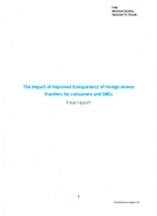The Government’s vision is for the UK’s financial services sector to be the most competitive and innovative in the world, delivering greater choice and value for consumers and businesses. A competitive and transparent financial services sector fosters innovation and economic growth, and is vital to ensuring that the UK economy delivers high quality products and services at efficient prices.
In the market for money transmission services involving foreign exchange (that is, sending money abroad), it has been suggested that lack of transparency from suppliers about the cost to customers is contributing to welfare losses to SMEs and consumers. For example, it has been argued that SMEs in the UK paid £3.96 billion in so called ‘hidden fees’ for foreign exchange transactions in 2015. The Government is looking to establish whether lack of transparency or standardisation in how fees (including ‘hidden fees’, collectively now referred to as ‘fees’) for sending money abroad are presented is hindering effective competition in this space, and having a detrimental impact on the choices made by consumers. In addition, it is looking to build evidence on what type of disclosure about fees is most helpful to consumers in choosing the right product for them.
The Behavioural Insights Team (BIT) conducted an online experiment using our testing platform, Predictiv (www.predictiv.co.uk). The test comprised of a simulation in which participants were given a hypothetical scenario where they were asked to change some money from £GBP to $US. Each participant could choose to stick with a particular option (combining an exchange rate with a fee and commission, which were sometimes set to zero) or to search for an alternative option with a different exchange rate, fee or commission combination.





